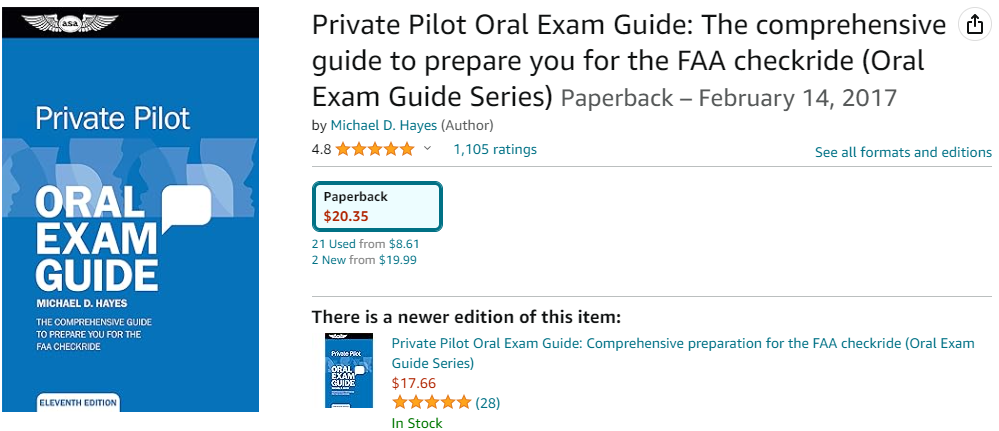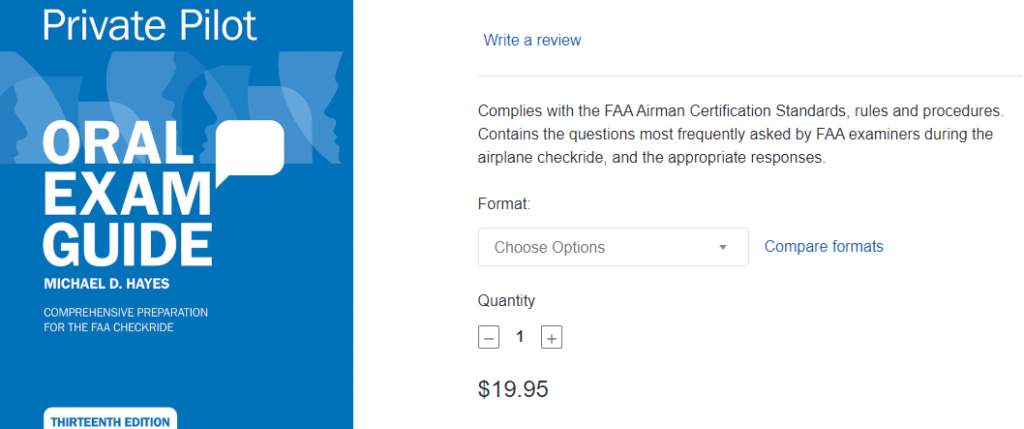Embarking on the journey to become a private pilot is an exciting endeavor, and the oral exam is a significant milestone in this process. Aspiring pilots often find the oral exam to be both challenging and nerve-wracking. In this guide, we will explore the essential aspects of the private pilot oral exam, offering insights, tips, and real-life experiences to help you prepare effectively.
Related: Chegg Answers Free – How to See Chegg Answers for Free Without Payment
- Private Pilot Oral Exam Guide
- Private Pilot Oral Exam Guide Purchase: Best Purchase Option
- Common Oral Exam Questions
- Handling Nervousness
- Interactive Scenario-based Questions
- Communications Skills Assessment
- Regulatory Knowledge
- Emergency Procedures
- Practical Test Standards (PTS)
- Examiner Expectations
- Post-Exam Reflection
- Conclusion
- Frequently Asked Questions (FAQ)
- Additional Resources
Private Pilot Oral Exam Guide
Understanding the Exam Format
Before diving into preparation, it’s crucial to have a clear understanding of the oral exam’s format. The exam typically covers a broad range of topics, including navigation, aircraft systems, weather knowledge, and regulatory matters. Familiarize yourself with the structure to better tailor your study plan.
Reviewing Key Topics and Knowledge Areas
The oral exam encompasses various knowledge areas outlined by the FAA. These include navigation and flight planning, aircraft systems, emergency procedures, and more. Take the time to review each topic thoroughly, ensuring a comprehensive understanding.
Effective Study Strategies
Developing effective study strategies is key to success. Utilize resources such as textbooks, online materials, and practice exams. Consider forming study groups with fellow aspiring pilots to facilitate collaborative learning and discussion.
Private Pilot Oral Exam Guide Purchase: Best Purchase Option
It is our duty to completely guide you on how you can purchase and use private pilot oral exam guide at the most affordable rate. Now let’s explore some of these options because we know everyone like it cheap if not free. This guide is authored by Michael D. Hayes and it is a great guide to purchase if you want to ace your private pilot oral exam. See the best purchase options below.
1. Amazon
On Amazon, this book has a 4.8 star rating and is available in paperback for $20.35. As seen in the image below, there is even a newer edition of this book for $17.66. Some people may prefer purchasing from Amazon because of its credibility, but the price may not be so friendly or affordable.
2. mypilotstores
mypilotstores.com seems to make a cheaper offer than Amazon at a price of $15.50. On this website, the book has 38 customer reviews, with 23 of them giving it a 5 star rating at the time this post was published.
3. asa2fly
You can also purchase this book from asa2fly.com who are the publishers of this guide. It is at a price of $19.95.
Common Oral Exam Questions
Navigation and Flight Planning
Examiners often focus on a candidate’s ability to plan routes, interpret charts, and make in-flight decisions. Be prepared to discuss navigation techniques, cross-country flight planning, and the use of navigation instruments.
Aircraft Systems and Operations
Demonstrate your knowledge of the aircraft you’ll be flying. Be ready to discuss the different systems, their functions, and how they contribute to the overall operation of the aircraft.
Weather Knowledge and Decision-Making
Weather plays a crucial role in aviation safety. Expect questions related to interpreting weather reports, making weather-related decisions, and understanding the impact of weather on flight.
Handling Nervousness
Tips for Managing Stress During the Oral Exam
Feeling nervous is natural, but effective stress management is essential. Practice relaxation techniques, get a good night’s sleep before the exam, and maintain a positive mindset. Remember, confidence is a key factor in success.
Confidence-Boosting Techniques
Boost your confidence by thoroughly reviewing challenging topics, conducting mock oral exams, and seeking feedback from experienced pilots. The more prepared you are, the more confident you’ll feel during the actual exam.
Interactive Scenario-based Questions
Responding to Situational Challenges
Examiners may present you with hypothetical scenarios to assess your decision-making skills. Approach these questions methodically, consider all relevant factors, and communicate your thought process clearly.
Demonstrating Decision-Making Skills
The ability to make sound decisions in real-time is crucial for a private pilot. Practice decision-making exercises and scenarios to hone your skills and develop a proactive mindset.
Communications Skills Assessment
Importance of Clear and Concise Communication
Effective communication is paramount in aviation. Practice articulating your thoughts clearly and concisely. Emphasize the use of proper aviation terminology to ensure effective communication with air traffic control and other pilots.
Practicing Effective Communication
Engage in realistic communication exercises, such as simulating radio calls and in-flight communications. The more comfortable and proficient you become in communication, the better you’ll perform during the oral exam.
Regulatory Knowledge
Understanding FAA Regulations
A solid understanding of FAA regulations is non-negotiable. Be prepared to discuss various regulations, including airspace rules, pilot licensing requirements, and operational limitations.
Compliance and Safety Measures
Highlight your commitment to compliance and safety. Emphasize your awareness of regulations designed to ensure the safety of both yourself and others in the airspace.
Emergency Procedures
Preparedness for Emergency Situations
While emergencies are rare, being prepared is essential. Know the emergency procedures for your aircraft and be ready to discuss how you would handle various unexpected situations.
Quick Decision-Making in Critical Moments
Examiners may assess your ability to make rapid decisions in critical situations. Practice scenarios that require swift decision-making to demonstrate your competence under pressure.
Practical Test Standards (PTS)
Overview of the PTS for Private Pilot Certification
Familiarize yourself with the Practical Test Standards (PTS) for private pilot certification. The PTS outlines the specific tasks and maneuvers you’ll be evaluated on during the flight portion of the examination.
Demonstrating Proficiency in Required Tasks
Focus on mastering each task outlined in the PTS. Practice flying maneuvers, navigation, and emergency procedures to ensure you can demonstrate proficiency during the practical portion of the exam.
Examiner Expectations
What Examiners Look for in a Candidate
Examiners seek candidates who not only possess the required knowledge and skills but also demonstrate professionalism, a positive attitude, and a commitment to safety. Showcase your dedication to becoming a responsible and skilled private pilot.
Professionalism and Attitude
Maintain a professional demeanor throughout the exam. Show respect for the examiner, answer questions confidently, and exhibit a positive attitude, even when faced with challenging inquiries.
Post-Exam Reflection
Evaluating Performance and Learning from the Experience
After the oral exam, take time to reflect on your performance. Identify areas of strength and areas for improvement. Use this reflection as a foundation for ongoing learning and development.
Continuous Improvement for Future Flights
Private pilot certification is just the beginning. Commit to continuous improvement in your skills and knowledge. Strive to be a lifelong learner, consistently seeking opportunities to enhance your proficiency as a pilot.
Conclusion
In conclusion, the private pilot oral exam is a significant hurdle on the path to certification. By thoroughly preparing, staying confident, and showcasing your knowledge and skills, you can overcome this challenge and move one step closer to realizing your dream of becoming a private pilot.
Related: How to Get Chegg Answers for Free (4 Proven Methods)
Frequently Asked Questions (FAQ)
How can I demonstrate professionalism during the exam?
Maintain a respectful and positive attitude throughout the exam. Answer questions confidently, listen attentively to the examiner, and show your commitment to safety and professionalism.
What should I do if I don’t know the answer to a question during the exam?
If faced with a challenging question, remain calm and express a willingness to find the information. Examiners appreciate honesty, and it’s better to admit uncertainty than to provide incorrect information.
How often should I review and update my knowledge after obtaining certification?
Regularly review and update your knowledge to stay current with regulations, best practices, and technological advancements. Continuous learning is essential for maintaining proficiency and safety.
Can I retake the oral exam if I don’t pass on the first attempt?
Yes, you can retake the oral exam if you don’t pass initially. Use the experience as a learning opportunity, address the areas that need improvement, and approach the retake with enhanced preparation and confidence.
Additional Resources
Books, Apps, and Online Materials for Exam Preparation
Explore a variety of resources to enhance your preparation. Books, mobile apps, and online platforms offer interactive study materials, practice exams, and additional insights to bolster your knowledge.
Practice Exam Platforms
Engage in practice exams to simulate the exam environment. This not only helps reinforce your knowledge but also familiarizes you with the format and time constraints of the oral exam.








